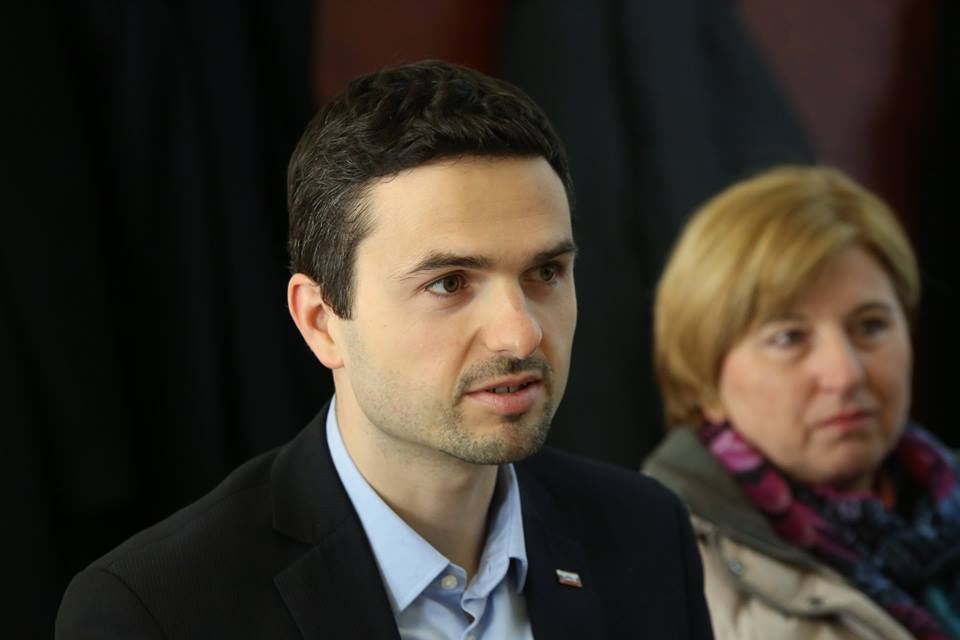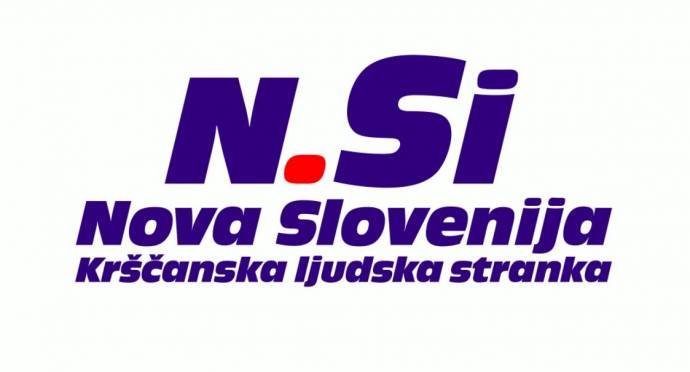STA, 10 April 2018 - At the end of January, the NSi changed its leadership in a surprise move; Ljudmila Novak, 58, resigned as party leader, giving way to Matej Tonin, 24 years her junior, who is expected to be endorsed as full-fledged president at a congress this month.

Matej Tonin and Ljudmila Novak
Novak, having come to lead the NSi in late 2008 after the NSi somehow unexpectedly failed to enter parliament, resigned after suffering a painful defeat in the 2017 presidential election.
Stepping down was hard, but Novak had failed to advance to the presidential run-off and even failed to outperform the candidate of the rival Democrats (SDS).
While she is credited with taking the NSi back to parliament in 2011, something that is most likely her biggest political achievement, Novak had obviously realised her moderate politics could no longer bring the desired success.
The party now hopes Tonin, who had been mentioned as a new leader before, will give it a new impetus as it is gearing up to double the number of its current MPs to ten.
Tonin, a political scientist who presented his vision in a 2016 book Hope for Slovenia, will keep the party on the path of Christian democracy, modernize it and build on freedom, justice and security.
Pundits say the change could help normalise relations among centre-right parties after Novak had distanced herself from the SDS's increasingly radical policies, even if the two parties still join forces in parliament, most recently by filing a bill to shield the NLB bank from lawsuits in Croatia.
But it remains to be seen whether this helps it outdo its best election result since it was formed in 2000 - nine MPs in the 90-strong parliament and entering the Janez Janša government in 2004.
The party has not been doing very well in recent opinion polls; in the Vox Populi poll, its support has dropped from around 6.5% in November 2016 when the NSi held the last election congress to around 3.5% last month, which is below the threshold to enter parliament. In the latest Delo poll, however, it polled at 6%.
Political analyst Alem Maksuti says that while opinion polls should be taken with a grain of salt, he feels the party's optimum result will be entering parliament, at the same time gaining or losing one seat.
"The party is well known in the public, and the recent change of leadership has further consolidated this, but the constellation of other political players sets the pace of the political race making every percentage extremely hard to win," he told the STA.
The party has some 10,000 members. Together with the SDS and the non-parliamentary People's Party (SLS), it is referred to as one of the parties of the Slovenian Spring - the period of democratisation at the turn of the 1990s.
Maksuti sees it as "a typical conservative Christian democratic party based on traditional values such as the family, while it could be said to be more extremist in terms of economic policies, betting on the values of neoliberal capitalism".
Indeed, the NSi has been pushing for an encouraging business environment, trying to position itself as a party of capital. It also favours private investment in healthcare and advocates the development of private schools.
While it supports EU enlargement in general, it is against Turkey's membership, and believes immigration from non-EU countries should be limited and controlled.
It considers the union between man and woman a natural one and is worried about the country's low birth rate, but would not go as far as banning abortion.
When the government tried to legislate full marriage equality a few years ago, the NSi campaigned against homosexual couples being able to adopt children.
This is one of the points it has in common with Aleš Primc's new party Voice for Children and Families, which is seen as having the potential to steal the NSi's more rightist voters.
Andraž Zorko from pollster Valicon believes the NSi is too soft for part of its potential voters, while the other part, including the Catholic Church, sees it as unable to win an election. For centre-left voters, it has a Church stigma or even a stigma of a party associated with the WWII fifth column.
The party has strongly campaigned for reconciliation between those who fought on the opposite sides in WWII, and has condemned all totalitarian regimes, including communism.
It has also been doing relatively well in European elections, which are in Slovenia as a rule won by members of the conservative European People's Party (EPP).
It won the first Euro elections Slovenia took part in after joining the EU in 2004 by getting two of the seven seats, and Peterle is the only Slovenian MEP to have served ever since.
Other articles in this series can be found here.







